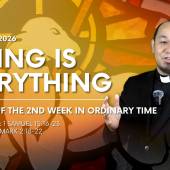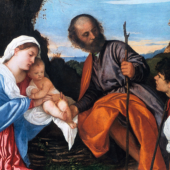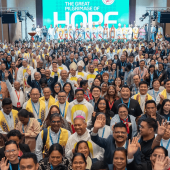8 Reasons Why People Marry

I once came across these touching lines on a wedding invitation:
If you are asking how long I'll need you, the answer is forever.
If you are asking when I'll leave you, the answer is never.
If you are asking what I value, the answer is you.
If you are asking whether I want to marry you, the answer is “I do.”
Charming, isn’t it? Words like these can make anyone dream of marriage. They transport us into a world of romance and promise. But they also got me thinking seriously: why do people marry?
When I asked friends about their reasons for marrying, many answered quickly: “Either you become a priest/nun or you marry.” In earlier generations, remaining single was almost unthinkable. Those who did not choose marriage or religious life were sometimes unfairly judged as “not fit” for either vocation. Times have changed. In today’s world, especially in metropolitan cities, remaining single has become a real option for many.
Still, most people do marry. Yet, when I probed deeper, I realized that many enter marriage without fully knowing why. Often, they go with the flow of society or act out of fear and pressure. Let me share with you eight common reasons why people marry.
1. Companionship
I once officiated at the wedding of a couple, he was 45, she was 38. When I asked why they had decided to marry at this stage of life, their answer was simple: companionship.
Many people fear growing old alone. They long for someone to talk to, to laugh with, to pass the time with. As the saying goes, “Man is incomplete without a woman, and woman without a man.” Companionship remains one of the strongest reasons people tie the knot.
2. Bodily Union
After hunger and thirst, one of the most powerful human desires is sexuality. Marriage gives couples the social and moral space to express this gift in a responsible way. For some, the dream of experiencing marital intimacy, even the idea of a “honeymoon”, becomes a primary motivation for marriage.
However, this is an area where many couples struggle. The misuse of pornography has distorted expectations and led to deep wounds in marriages. Sexual incompatibility, selfishness, or unrealistic fantasies have left many unions broken.
3. Progeny
Children are often described as the crowning glory of marriage. Many couples marry primarily because they long to have children. I recall meeting a Scandinavian couple in Europe who had been living together for seven years. The wife finally said to her partner, “There is no point in staying together if we are not going to have babies.” And so, they married.
The desire to create life and nurture children is deeply embedded in human nature. For many, having babies gives their marriage meaning and direction.
4. Security
Questions about the future weigh heavily on people’s minds: “If I remain single, who will take care of me when I grow old? Will I end up in a nursing home, lonely and forgotten?”
Marriage seems to promise a kind of safety net, children who will care for their parents, and a spouse who will provide emotional and physical support in old age. While this is not always guaranteed, the hope for security remains a powerful motivation for many to say “I do.”
5. Social Stigma
In many cultures, especially in the past, being unmarried carried a social stigma. People who remained single were often pitied, ridiculed, or considered “cursed.” Whether they were happy or not seemed irrelevant; society pressured them to marry simply to escape shame.
Today, in many urban societies, this stigma has lessened. Yet, in rural or traditional communities, it still persists. Families often push their children to marry “because what will people say otherwise?”
6. Wedding Ceremony
For some, the attraction is not the marriage itself but the wedding. The glamour, the gown, the photographs, the music, the fairy-tale atmosphere, all these hold irresistible charm. Salman Rushdie, an award-winning Indian writer, once remarked, after his fourth divorce, “Women are not interested in marriage. They are interested only in wearing wedding gowns.” Many couples spend more time planning the wedding day than preparing for the marriage that follows.
When the focus is on the party rather than the partnership, marriages often stumble quickly.
7. Money
Finances also play a big role in marriage. In both arranged and love marriages, money “speaks.” Sometimes wealth overshadows virtues like honesty, kindness, or faith. A boy working abroad with a handsome salary, car, and apartment may be considered far more eligible than the God-fearing, hardworking young man next door.
Sadly, financial motives often distort the beauty of marriage. Dowries, inheritance expectations, and even the promise of alimony in case of divorce all affect people’s choices.
8. Born for Marriage
Finally, many marry simply because they believe it is their destiny. “We were born to marry, to produce children, and to continue the family line,” they say. From the beginning of creation, the Bible affirms, “It is not good for man to be alone” (Genesis 2:18). Adam longed for a partner, and God gave him Eve. This longing remains alive in every generation.
Marriage in the Catholic Vision
For Catholics, marriage is far more than a social contract or personal arrangement. It is a sacrament, a visible sign of God’s love. Christian marriage is meant to mirror Christ’s unbreakable covenant with the Church. It creates not just a family, but a domestic Church, a small but powerful cell of faith, love, and witness.
This is why the Church insists on serious preparation for marriage. It is not only about companionship, children, or security. It is about forming a stable, faith-filled home that will nurture disciples, strengthen the Church, and extend God’s kingdom.
In the end, people marry for many reasons, some noble, some superficial, some practical, some deeply spiritual. But for us Christians, marriage finds its fullest meaning when it is lived as a vocation: a lifelong covenant of love that reflects God’s own fidelity.
(Fr. Nelson Lobo, OFM Cap, is an Indian Capuchin friar. He currently serves as the Director of Catechism, Faith Formation, and Bible Studies in the Apostolic Vicariate of Northern Arabia [AVONA], and is based at the Holy Family Co-Cathedral, Kuwait.)
Radio Veritas Asia (RVA), a media platform of the Catholic Church, aims to share Christ. RVA started in 1969 as a continental Catholic radio station to serve Asian countries in their respective local language, thus earning the tag “the Voice of Asian Christianity.” Responding to the emerging context, RVA embraced media platforms to connect with the global Asian audience via its 21 language websites and various social media platforms.














